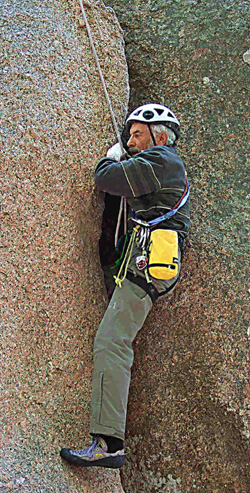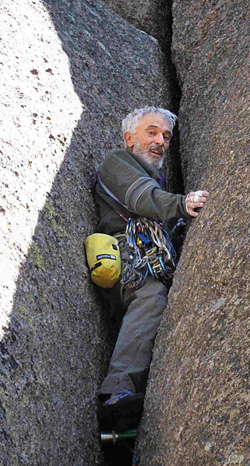www.johngill.net
| Senior Athletes : Rob Kelman 2007 |
 Beckey's Crack - Enchanted Rock, TX April, 2007 |
 Mother #1 -Veedauwoo August, 2007 |
|
Rob Kelman Questionnaire Section A. 1. Year of birth: 1930 2. Height & weight (now and at younger age): 5'9", 145 lb. I think I've lost about an inch over the years. Weight has stayed the same. 3. Year you began rock climbing and/or bodyweight athletics: I've always been athletic-mostly football, basketball and softball from pre-school to graduate school plus some hiking, fishing, and skiing in the appropriate seasons. I started weight lifting in 1954 in graduate school (free weights)and have continued with it. I have a large exercise room at home with 900lb. of free weights plus a power cage. During the winter, I don't climb and enjoy concentrating on weight lifting. During climbing season, I try to do a very light lifting workout once a week. I started climbing in 1971 as my older son wanted to get into it. I've been doing it ever since. 4. Are you retired? Still working?: Both. I retired as chairman of computer science at Colorado State University in 1989. I still work a bit as a technical writer and editor. In addition, I have a publishing company, Heel and Toe Publishers that I started to publish my own guide to Rock Climbing at Vedauwoo, Wyoming I've since published a few books by other authors. 5. Is your family supportive of your rock climbing and/or bodyweight athletics: My children and grandchildren think it's fine. My wife is tolerant of my climbing and supportive of my weightlifting. . 6. How important is the social aspect of the sport for you?: I enjoy the social aspect of the sport, but that's not why I do it since there are so many other ways to enjoy social interaction. Section
B.
1. Type of rock climbing (or bodyweight athletics) you now enjoy: Mostly, what is now called 'traditional climbing'. I'm leery of bouldering, which I used to do a lot of, because of problems with my left knee. I'm not prepared to take the risk of falls that are intrinsic to bouldering. I continue to weight lift, because I enjoy it per se. The fact that it helps me climb better is secondary. 2. Type you enjoyed at a younger age?: Hasn't changed except for the bouldering. 3. Do you engage in auxilliary training or associated athletics?: Nothing, other than what I listed above. 4. How often do you climb or exercise now?: 5-6 days/week. At a younger age (<65)?: same. 5. Length of climbing (or exercise) sessions now?: Climbing is mostly an all-day affair. Weight lifting from one to three hours. 6. How long does it take for fairly complete physical recovery?: If I've exhausted myself, at least a full day. As I've gotten older, the emphasis has been on "at least". 7. At what level of difficulty do you now climb (exercise)? Past levels?: Lead 5.9 on a good day with the wind at my back. I used to lead 10- mostly on sight with some 11s on my home turf. Occasionally, I now get stumped on a 5.8. Also, what I've noticed looking back my climbing diary (which goes to 1985) is that even though I think I'm moving fast, I climb fewer pitches than 20 years ago in a given day. 8. What changes have you observed in strength and endurance over the years? Grip strength? Arm & upper body strength? Legs? : Grip strength is something I've never measured. It seems OK. Strength has held up rather well although I lift lighter than when I was younger. I can still do chinups with, say, about 75 lb. on my back when I train for it in the winter. The biggest decline is in maximal VO2 capacity. I'm really slow on approaches. I can keep going all day but at a reduced pace. My reading of the literature on this shows it's rather inevitable after age 70. Easier to maintain strength than maximal aerobic capacity. The problem is not so much heart and lung function as the fact that the mitochondria in muscles and other tissues do not take up oxygen effectively. When I climb with younger people (and who else is there to climb with), I gladly accept their offers to carry more of the load on approaches. Because of the care with which I must set my left leg, I'm also slow on descents. See next question. Section
C.
1. Any injuries or illnesses since age 65 affecting your climbing/exercising? How have you coped? NSAIDs or other medication? : I currently take no medications, prescribed or self-selected, except for some occasional Aleve. A bottle of 50 tablets usually lasts longer than ayear. Starting with a torn meniscus 35 years ago from basketball and yoga, I have had several injuries to my left knee and tibia with the coup de grace being a bouldering fall off the Prow at Rotary in 1978. The knee is arthritic as judged by x-ray. When I get my annual examination from my orthopedist, he always says that he doesn't understand why the knee is flexible, not swollen, and not in pain. My standard answer is high-repetition, medium-weight squats. He doesn't buy that but has given up telling me that it is an inappropriate exercise. I was born with a defective aortic valve. When I was 67, it was replaced with a bovine prosthesis in open heart surgery. This kept from weight lifting for about six months. Another six months as I slowly built up to feel like climbing again. Thus far I've had no problems with the prosthesis. 2. What kind of diet do you follow, if any? Vitamins? Stimulants?: I eat a lot whole grains, fruits and vegetables, and moderate on everything else. I do maintain a very low sodium intake (under 800 mg/day). The low sodium is because of an inherited tendency to high blood pressure. It seems to work as my blood pressure has returned to normal levels and remained there for the past 30 years I've been on the low sodium intake. I do not take any vitamins,as there is no evidence that supplements have any value for someone eating a good diet (or for that matter showing that supplements do not have deleterious side effects). I drink coffee, tea, beer and wine. 3. Special food or drink after a workout?: If I climb all day or have a heavy lifting workout, I like a glass of chocolate milk afterwards. 4. Water or fluid intake? High? Low?: My drinking is governed by my thirst. Most of what's written about fluid intake is promoted by manufacturers of the fluids or by trainers selling their services. The scientific evidence to override the thirst mechanism in healthy individuals(e.g., no diabetes mellitus, nephritis, kidney stones, etc.) is totally lacking. Section
D.
1. What is your current philosophy of your sport? Has this changed with age? : I don't have a philosophy. I climb because I enjoy it. No. 2. What are your current goals and personal rewards from the sport? Has this changed with age?: Read the reply to the previous question. I'll keep climbing as long as I enjoy it. If I live long enough, I assume there'll come a time when it might not be appealing. Currently, each fall I teach a class in wide-crack climbing for the Colorado State University Outing Club. I find a perverse satisfaction in teaching strong young people, who overall are better climbers than I, how to ascend an offwidth. 3. What is your opinion: Is rock climbing (bodyweight exercises) performance - at any age - influenced more strongly by genetic attributes or training and experience? (Nature or nurture?) Is it even possible to generalize?: Everything is all genetics and all environment. I'm no expert in the research it would take to figure out how these interact in climbing. 4. What are your predictions for the future of rock climbing?: One of my first industrial jobs (1957) was in nuclear energy. All predictions made by knowledgeable and intelligent people at that time about the future of nuclear energy were wrong. That deeply influenced me. I don't make predictions and do not take seriously those made by other people. |